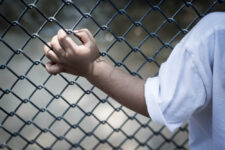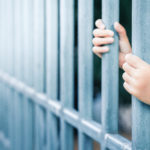It’s Time to Raise the Age of Criminal Responsibility in Australia

All eyes were on last week’s meeting of the Council of Attorneys General, as there has been a sustained campaign calling on the nation’s top lawmakers to raise the age of criminal responsibility in this country, which currently sits at 10 years old.
NSW attorney general Mark Speakman emerged from the meeting to announce that the council had decided they need to look into alternatives to the current system, so they’re going to deliberate some more, write up a report, and next year will be “crunch time” on the issue.
This doesn’t really bode well for any kids between the ages of 10 and 14 that might fall short of the law over the next 12 months, because once an individual comes into contact with the criminal justice system, it can become a revolving door that can keep swinging back round for a lifetime.
Raise the Age points out that one year saw “close to 600 children aged 10 to 13” imprisoned. While Aboriginal and Torres Strait Islander children account for 65 percent of all younger children incarcerated and this results from “differential treatment and the criminalisation of disadvantage”.
And the AGs calling a year-long hiatus seems all too familiar, as following the November 2018 meeting of the Council of Attorneys General, federal AG Christian Porter announced that a 12 month working group would be looking into raising the age and reporting back on the matter.
Sitting on their hands
“For years, there has been consensus among child psychologists, health professionals and legal experts that 10 is far too young for a child to be treated as a criminal,” said Civil Liberties Australia (CLA) president Dr Kristine Klugman.
“Doing so only serves to embroil children in the criminal justice system and a life of further offending,” she told Sydney Criminal Lawyers. “In Australia, it is predominantly Indigenous children who are affected.”
The 2020 Productivity Commission report outlines that over the year 2018-19 the average daily detention rate for First Nations youths between the ages of 10 to 17 was 31.2 per 10,000, which is 23 times higher than the rate for their non-Indigenous counterparts.
The average daily number of youths incarcerated between the ages of 10 to 17 over that same period saw 446 First Nations kids locked up, which accounted for 58 percent of the young people in prison. However, Indigenous youths only make up around 5 percent of the overall populace.
Dr Klugman further pointed out that the age of criminal responsibility being set at 10 puts Australia out of step with the majority of comparable nations, which have set their age at 14, while some have it at 16 years old.
The civil liberties advocate added that politicians are good at making apologies for their predecessors – citing the apology for the Stolen Generation – however “when these same politicians have an opportunity to do something for children today, they prefer to sit on their hands”.
Locking up First Nations kids
Research carried out by Amnesty International found that children locked up at the age of 10 are three times more likely to become chronic adult offenders, than kids imprisoned at 14 years old, which is the age that campaigners are calling on attorneys general to set criminal responsibility at.
Raise the age campaigner Dr Mick Creati stated last year that children under 14 “have relatively immature brain development when it comes to decision-making, organisation, impulse control and planning for their future”, so their actions shouldn’t be criminalised, and nor should they be gaoled.
Following last week’s announcement, Aboriginal Legal Service of WA chief executive Dennis Eggington explained that in his state there’s only one youth detention centre, and at present, 70 percent of children and youths held in it are First Nations.
And he further set out that many of these children are affected by direct and intergenerational trauma, cognitive impairments, intellectual and developmental disabilities and fetal alcohol spectrum disorder (FASD).
Amnesty’s 2018 The Sky Is the Limit report explains that not only will imprisoning children under 14 fail to address any issues, but it will only serve to compound them, which can lead to lifelong engagement with the criminal justice system.
“Indigenous children are more likely to experience trauma than their non-Indigenous peers because of the cumulative effect of historical and intergenerational trauma,” the researchers further assert, “which can all be traced back to colonisation.”
The report also notes that when former UN Special Rapporteur on the Rights of Indigenous Peoples Victoria Tauli-Corpuz visited Australia in 2017, she found the routine detention of 10 and 11-year-old children the most distressing aspect of her investigation.
Raise the age
However, according to NSW attorney general Mark Speakman, his state is yet to be convinced that the age of criminal responsibility should be raised to 14. And he cited an incident in far northern Queensland involving 13-year-olds as an example as to why.
Despite being somewhat out of his jurisdiction, it might be pondered what kind of point the state AG was trying to make by bringing up a case that involves Indigenous youths as an example as to why the age of criminal responsibility should perhaps be kept at 10 years of age.
NSW Bureau of Crime Statistics and Research figures (BOCSAR) show that in June this year there were 77 First Nations youths incarcerated in this state, which accounted for 40 percent of all youths in detention.
However, Aboriginal and Torres Strait Islander youths only account for around 5 percent of the overall NSW population under the age of 18.
“It is time they got real,” Dr Klugman concluded. “The age of criminal responsibility is largely up to individual states and territories.”
“It is time for those jurisdictions that see themselves as progressive and as believers in human rights to change their laws. Then the governments that prefer to treat young kids as criminals will no longer be able to hide.”







